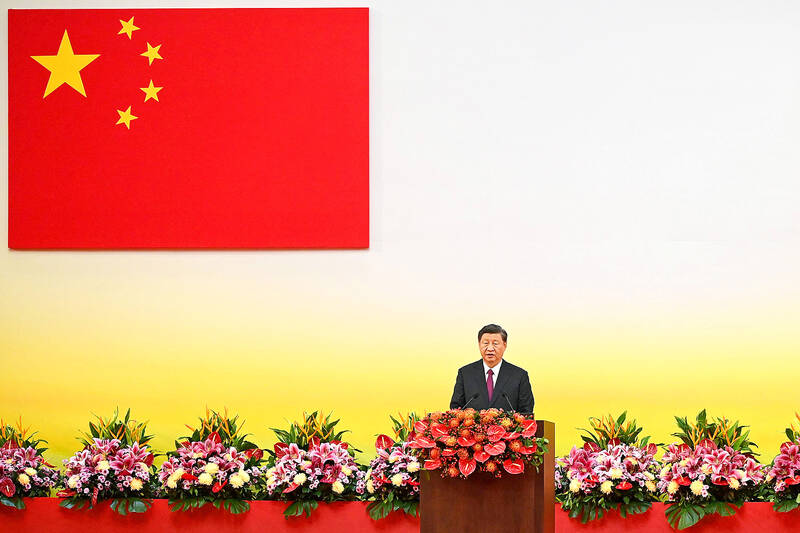China is unlikely to attempt a military invasion of Taiwan in the short term, but would continue pursuing a “salami slicing” strategy with the aim of forcing Taiwan to talk, a research report says.
Chinese President Xi Jinping (習近平) “has a clear intention to unify Taiwan, but the means he would employ to attempt this are vague, and both peaceful unification and the use of military force would remain as possible options,” the report by the Institute for National Defense and Security Research says.
Xi sees China’s unification with Taiwan as being closely linked to his plans for the so-called “great rejuvenation of the Chinese nation,” the report says.

Photo: Reuters
“Xi still sees peaceful unification as the best option to achieve that end, but is also preparing for the worst-case scenario,” it says. “At this stage, the probability of China launching a military attack on Taiwan is low, but if the issue is left to Xi alone to decide, the risk of trouble in the Taiwan Strait goes up.”
The Chinese Communist Party’s (CCP) strategy for pursuing peaceful unification would involve retaining the option of using force, and using threats and coercion to sow a rift in Taiwanese society, forcing Taiwan to the negotiating table, the report says, adding that China would continue attempts to infiltrate Taiwanese society through the guise of various types of exchanges.
Citing examples, the report says China’s large-scale military exercises in the Taiwan Strait held on Sept. 11 last year demonstrated an attempt at intimidation of Taiwanese, while its “cross-strait development plan” promising benefits for Taiwanese who relocate to Fujian Province is an attempt at infiltration and division of Taiwanese society.
At the same time, China’s military drills were intended as a show of force to the US, which it hopes to deter from military involvement in a potential conflict in the Taiwan Strait, the report says.
“Rather than outright launching a war, the CCP is seeking to pressure Taiwan politically, militarily, economically, psychologically and socially,” it says.
However, if decisionmaking power in the CCP is completely concentrated in Xi alone, and CCP bureaucrats lose their advisory functions, the risk of Xi acting rashly in the Taiwan Strait would increase significantly, the report says.
Taiwan’s government and military would need to carefully plan for that contingency, and be prepared for the possibility of an armed conflict with China, it says.

Taiwan is stepping up plans to create self-sufficient supply chains for combat drones and increase foreign orders from the US to counter China’s numerical superiority, a defense official said on Saturday. Commenting on condition of anonymity, the official said the nation’s armed forces are in agreement with US Admiral Samuel Paparo’s assessment that Taiwan’s military must be prepared to turn the nation’s waters into a “hellscape” for the Chinese People’s Liberation Army (PLA). Paparo, the commander of the US Indo-Pacific Command, reiterated the concept during a Congressional hearing in Washington on Wednesday. He first coined the term in a security conference last

Prosecutors today declined to say who was questioned regarding alleged forgery on petitions to recall Democratic Progressive Party (DPP) legislators, after Chinese-language media earlier reported that members of the Chinese Nationalist Party (KMT) Youth League were brought in for questioning. The Ministry of Justice Investigation Bureau confirmed that two people had been questioned, but did not disclose any further information about the ongoing investigation. KMT Youth League members Lee Hsiao-liang (李孝亮) and Liu Szu-yin (劉思吟) — who are leading the effort to recall DPP caucus chief executive Rosalia Wu (吳思瑤) and Legislator Wu Pei-yi (吳沛憶) — both posted on Facebook saying: “I

The Ministry of Economic Affairs has fined Taobao NT$1.2 million (US$36,912) for advertisements that exceed its approved business scope, requiring the Chinese e-commerce platform to make corrections in the first half of this year or its license may be revoked. Lawmakers have called for stricter enforcement of Chinese e-commerce platforms and measures to prevent China from laundering its goods through Taiwan in response to US President Donald Trump’s heavy tariffs on China. The Legislative Yuan’s Finance Committee met today to discuss policies to prevent China from dumping goods in Taiwan, inviting government agencies to report. Democratic Progressive Party Legislator Kuo Kuo-wen (郭國文) said

Sung Chien-liang (宋建樑), who led efforts to recall Democratic Progressive Party (DPP) Legislator Lee Kun-cheng (李坤城), was released on bail of NT$80,000 today amid outcry over his decision to wear a Nazi armband to questioning the night before. Sung arrived at the New Taipei District Prosecutors’ Office for questioning in a recall petition forgery case last night wearing a red armband bearing a swastika, carrying a copy of Adolf Hitler’s Mein Kampf and giving a Nazi salute. Sung left the building at 1:15am without the armband and covering the book with his coat. Lee said today that this is a serious